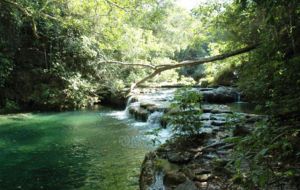MercoPress. South Atlantic News Agency
Brazilian president promises land reform and distribution for family settlers
 In Brazil 2% of the population holds over 50% of the best farmland
In Brazil 2% of the population holds over 50% of the best farmland Brazilian president Dilma Rousseff claimed that land reform was needed to eradicate poverty, avoid overcrowding in urban areas and as a matter of justice for the long delayed distribution of land.“
“Land reform is necessary to build a country with justice, food security and peace in rural areas”, wrote Ms Rousseff in a column distributed by the Planalto Palace, seat of the Executive.
It is the first time since taking office (January 2011) that the Brazilian president strongly supports land reform, which is highly criticized by the powerful Landless Peasants Movement, MTS, a growing political force in the country that consider the reform pace as too slow.
Ms Rousseff said that land reform makes access to land more democratic and guarantees the production of healthy and cheap food plus generating income and social well being in the camp areas.
According to Brazil’s Ministry of Agricultural Development, 80% of all produce consumed in the country originate in small and medium sized farms.
Rousseff promised her government would invest millions “in settling thousands of families and stimulating the agro-industries to increase production and add value to the small and medium farms harvests”.
She also anticipated the government would increase technical assistance, access to credit and infrastructure such as electricity, roads and supply of drinking water.
President Rousseff who set the target of eradicating the misery situation in which 16 million Brazilians live by the end of her four year mandate, said land reform was a powerful tool to achieve such a goal. Brazil’s population is 198 million.
“Land reform helps with the effort of eradicating extreme poverty and contributes to reduce overcrowding in the periphery of major cities. With this win-win situation the whole of Brazil is benefited and not only those directly involved”, she underlined.
This advanced as never before in the country’s history during the government of her predecessor and political mentor former president Lula da Silva, insisted Ms Rousseff.
According to statistics mentioned by the president, in the last forty years a million people were given plots in the framework of the land reform, of which 614.000 under the administration of President Lula da Silva. “Of the 85.8 million hectares distributed to small settlers, 56% was granted in the last eight years”
Land reform and distribution are the main reason for violence in the Brazilian camp according to the (Catholic) Bishops pastoral Commission on the land, an organization that works closely to the landless peasants MST.
In 2010 according to the Commission 34 people were killed over land disputes, up 30% over 2009.
According to the president of the Commission, Ladislau Biernaski, less than 2% of owners hold over 50% of land in Brazil and millions of hectares are taken over with fake documents, particularly in the heartland of the country and in the Amazon.
“Land reform helps solve conflicts” said Biernaski last week on presentation of the 2010 report on the camp situation which faces a sustained conflict between the huge agro-business groups and family farming.
Last April 29 MST leader Pedro Stedile said that Rousseff received an inheritance that will enable her to implement a ‘more left oriented’ government helping to make ‘social compensations and wealth distribution’.
Traditionally allies of the ruling Workers Party, Stébile called for greater emphasis on family farming and land reform than support for agro-business.




Top Comments
Disclaimer & comment rules-

-

-

Read all commentsSmall and medium sized farm plots are up to 4,000 hectares. This would be 'quite a big farm' in Europe.
May 13th, 2011 - 10:07 pm 0[These sized plots are the ones the Communist Party want excluded from the Environmental Protection legislation now 'under discussion' in the Senate.]
What the article does not say is the success rate of the land given to peasants.
This has been extensively researched and reported on here in Brasil.
Extremely low productivity-to-market, and selling-on of the land given, is the norm for the lands given to peasants - even in highly fertile areas.
Where the land given has already been broken for farming and has been already farmed, land dereliction and living off the Bolsa is the common alternative to working the land.
This is not simply a question of lack of education, farming knowledge, etc (though all of these are virtually absent), it is more that the Landless Peasant Movement is composed of itinerant activists who LIKE TO serially invade fazendas (the large farm-holdings) and government agricultural research stations.
Invasion, squatting and destruction of crops and buildings is the modus operandi (seen many times on all national News channels), followed by quasi-legal court proceedings, buying-off of the invaders and moving on. Killings are frequent in these invasions.
It is a country-wide caravan of semi-Government-sanctioned, and Government ONG-funded, extortion.
Yes, much needs doing about this, but the *opposite* approach to that proposed by Dilma Rousseff will serve Brasil by far the best.
It's going to be Mugabe's Zimbabwe all over again... but on a much larger scale.
May 14th, 2011 - 05:25 pm 0No, I don't think so Rio, and I hope not.
May 14th, 2011 - 07:22 pm 0Dilma is a disconcerting mix - a left wing pragmatist!
I doubt she will take Brasil to the brink like CFK in Argentina.
Commenting for this story is now closed.
If you have a Facebook account, become a fan and comment on our Facebook Page!